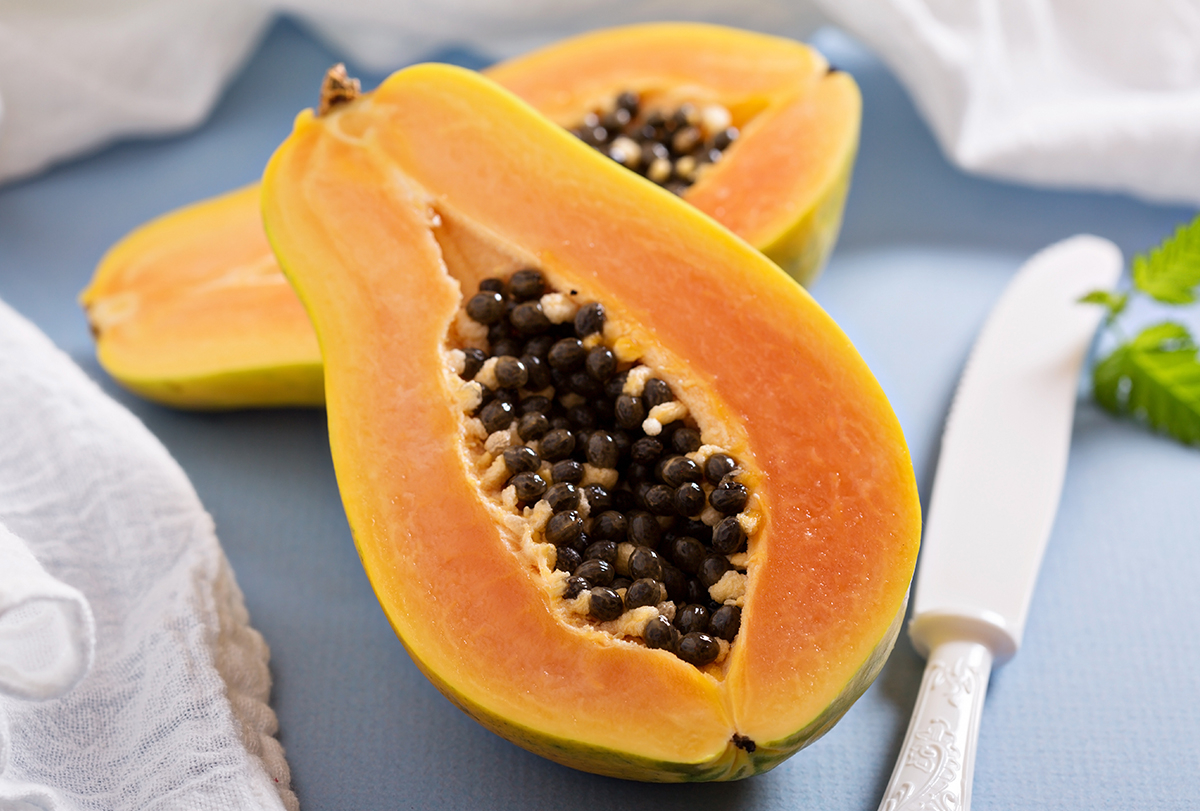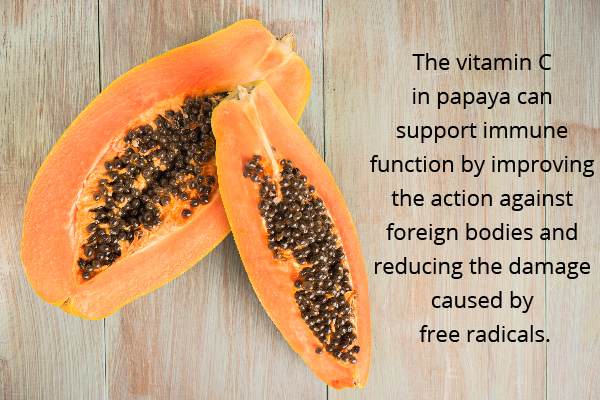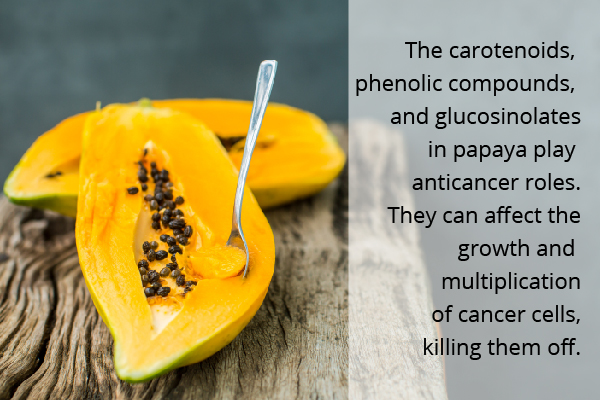In this article:
Papaya, native to Southern Mexico, Central America, and some parts of South America, is now also widely cultivated in tropical countries such as Malaysia and some countries of Asia, Africa, and the West Indies. Papaya and its leaves, stem, and seeds have been used medicinally in many folk medicines.

The pulp, seeds, and leaves of papaya contain antioxidants and can effectively lower high blood pressure, manage blood sugar levels, and lower blood cholesterol levels. These effects make papaya valuable in the prevention and management of obesity and associated metabolic disorders such as diabetes. (1)
The rich nutrient profile of this fruit makes it beneficial for improving issues of the digestive system and the heart, promoting skin health and immunity, and protecting against colon cancer.
Nutritional Profile of Papaya
One cup of papaya fruit (165 g) contains only 71 calories, 18 g of carbohydrates, and 2.8 g of fiber (10% of the total requirement of fiber). It also has a rich water content of up to 145.3 g. (2)
It is abundant in minerals as it contains 77.6 mcg of vitamin A, 0.05 mg of vitamins B3, 0.06 mg of vitamin B6, and 61.05 mcg of folate (15% of the daily need of the body), 110.5 mg of vitamin C (112% of the daily vitamin C requirement), and 4.3 mcg of vitamin K (4% of the daily requirement). (2)
It also has 34.7 mg of magnesium (8% of the daily requirement), 0.07 mg of copper (8% of the daily requirement), and 300.30 mcg of potassium (6% of the daily requirement). (2)
Health Benefits of Papaya Fruit and Its Seeds
Consuming papaya and its seeds can have many health advantages.
1. Improves heart health

Heart diseases such as high blood pressure and stroke are the leading causes of death in many developing countries. (3) Clinical studies have shown that reactive oxygen species (ROS) are one of the main contributors to damage within the cells of the heart. (3)
Papaya is abundant in polyphenols and vitamins that also act as antioxidants. (4) In one study, papaya significantly improved the antioxidant capacity within all tissues and muscles in mice. (4)
Therefore, consuming papaya can help provide the antioxidants necessary to maintain a healthy body.
2. May help in weight management
Several animal studies have reported that papaya has been effective in lowering blood cholesterol levels and in managing blood sugar levels. It also reversed the damage to liver cells and preserved kidney health. (1)
In addition, intake of foods that have high water content and are considered low density, such as papaya, has a beneficial effect on weight loss. (5)
Papaya, with its sufficient fiber and water content, can provide satiety and prevent overeating, thus aiding in overall weight reduction.
3. Promotes digestive health

Papaya is used as a natural remedy for indigestion in many tropical countries. It is known to have a beneficial effect on constipation, heartburn, and symptoms of irritable bowel syndrome (IBS). (6)
In one study, using a papaya supplement improved constipation, bloating, and IBS symptoms in patients with long-term indigestion and improper functioning of the digestive tract. (6)
Another review of studies has found papaya juice to be effective in clearing colon infection and managing some types of celiac disease. (7)
The extracts of papaya seeds are also useful in the treatment of stomach ulcers. In male rats, papaya seed extracts reduced stomach acidity, lowered acid secretion, and increased their antioxidant capacity. (8)
It can be concluded that papaya and its seed can be beneficial for stomach ailments and digestive distress.
4. Preserves kidney function
Papaya has a protective effect on the kidneys. Due to the rich antioxidant capacity of papaya and its seeds, they can preserve kidney function.
Animal studies have demonstrated papaya seeds to not only normalize the elevated kidney function markers but also reverse the damage caused to kidneys by paracetamol consumption. (9) These effects are attributed to the phytochemicals in papaya.
Anemia-associated inflammatory disorders, including kidney injury, can also be treated with papaya extracts. Animal studies have shown papaya to have a protective effect against anemia caused by renal disorders and improve all the markers of iron deficiency anemia. (10)
5. Fights inflammation

Long-term inflammation is responsible for the development and progression of many diseases including diabetes, atherosclerosis (accumulation of fatty plaques in the blood vessels), and even cancer. (11)
Several clinical studies and human trials have well demonstrated the anti-inflammatory properties of papaya and its extracts.
Due to its rich phytochemical content including carotenoids, tannins, and enzymes such as papain and chymopapain, papaya can effectively reduce inflammation and its associated side effects.
6. Promotes skin health
Papaya is also full of nutrients that promote skin health. A rich source of vitamin C, it helps protect the skin against damage by free radicals. It also improves the production of collagen, improves skin elasticity, and reverses UV-induced sun damage. (12)
In addition, the enzyme papain in papaya is useful for the removal of dead tissues from wounds. (13)
In test-tube studies, the use of papaya extract improved the thickness of skin and reduced the length of wounds. It also sped up the rate at which the wound closed, proving itself useful in the treatment of wounds. (13)
7. Boosts immunity

Papaya and its seeds are useful in modulating immune responses. Papaya seeds can improve the activity of lymphocytes, a type of cell responsible for fighting off infections in the body. (11)
The vitamin C in papaya can also support immune function by improving the action against foreign bodies and reducing the damage caused by free radicals. It improves the activity of white blood cells to fight off infection-causing bacteria and viruses. (14)
Including papaya as part of a healthy diet can be a great way to protect the body against infections.
8. May help regulate the menstrual cycle
Unripe papaya is also used as an effective pain reliever for menstrual pains and cramps. It can also reduce menstrual irregularities and promote natural menstrual flow. (7)
In a recent study comparing different herbal remedies for menstrual health, many women reported using papaya to regulate menstruation and to naturally increase healthy blood flow. (15)
9. May protect against cancer

The carotenoids, phenolic compounds, and glucosinolates in papaya play anticancer roles. They can affect the growth and multiplication of cancer cells, killing them off. (7)
Test-tube and animal studies have shown that papaya exhibits a significant antioxidant activity and reduces the risk of developing several types of cancers. In human trials, papaya extracts also reduced the changes that occur that lead to the development of cancer. (7)
While it is safe to conclude that papaya, through its antioxidant and polyphenol content, can exhibit cancer-protective actions, more human trials are needed to establish conclusive results.
How to Consume
Papaya is a versatile fruit with a slightly sweet creamy taste. It is often blended with frozen bananas to create a healthy version of ice cream (called nice creams).
It can be added to smoothies and eaten as a snack. It can also be cooked into desserts such as puddings and parfaits.
Papaya seeds can be eaten fresh, or they can be mixed into salad dressings, soups, and other dishes. You can also clean, dry, and powder the seeds to use in smoothies, cooking, or salad dressings.
Precautions to Consider
Papaya and its seeds are generally safe to consume with no known side effects. You can easily consume up to 1 cup of papaya fruit and 1 tablespoon of papaya seeds safely. However, as with any natural food, overconsumption needs to be avoided.
Who Should Not Eat Papaya?
Though papaya has a multitude of health benefits, people with uncontrolled diabetes need to be careful with its consumption. Pregnant women and people with allergies and irregular heartbeat need to avoid its consumption.
Final Word
Rich in carotenoids and other phenolic compounds, papaya is a versatile and easy-to-eat fruit. Its seed is also rich in several nutrients and has just as many health benefits.
From boosting immunity to fighting off infections, papaya’s antioxidant and anti-inflammatory properties help with heart diseases, preserve kidney function, and even exhibit protective roles against cancer.
Rich in fiber and water, this fruit can also aid in weight management and improves digestive health. Include 1 cup of papaya daily as part of a healthy well-balanced diet to reap all of its health benefits.
- Was this article helpful?
- YES, THANKS!NOT REALLY


